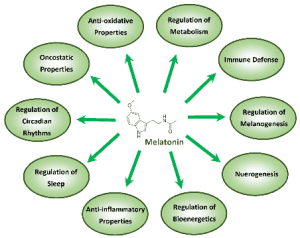Nowadays, melatonin tablets are commonly used to improve sleep and potential benefits for various health conditions.
Let us decode some facts

Melatonin is a hormone that plays a key role in regulating our sleep-wake cycle, also known as the circadian rhythm. It basically signals the body that it’s night time and time to wind down.
But here’s the catch — with our modern lifestyles, we often end up messing with this natural rhythm. Whether it’s staying up too late, working odd hours, or irregular sleep patterns, it can throw off the body’s internal clock. As a result, melatonin production may drop or become irregular.
To make things worse, our screen habits don’t help either. The blue light emitted from phones, laptops, and TVs actually suppresses melatonin production, making it even harder for our bodies to recognize its time to sleep.
That’s why many people today look for a quick fix — often turning to melatonin supplements to help them fall asleep.
On top of everything else, our rising stress levels—be it from work, relationships, or emotional challenges—are silently affecting our health.
This constant stress triggers oxidative stress in the body, creating an internal imbalance.
When the body is under oxidative stress, it struggles to maintain its normal functions, including hormone regulation.
Our hormones are like messengers that keep everything running smoothly—from mood and sleep to digestion and metabolism.
But when they get disturbed, it can lead to issues like fatigue, mood swings, irregular periods, weight gain, and poor sleep.
This hormonal imbalance often goes unnoticed until it starts showing up in these ways.
And sadly, we often treat the symptoms without addressing the root cause—stress.
The body needs time, rest, and nourishment to cope and recover.
Managing stress isn’t a luxury—it’s a necessity for hormonal health.
So take a pause, breathe, and give yourself the care your body truly deserves.
Now let us understand Magnesium

When we think about improving sleep or supporting healthy muscles, magnesium often comes to mind. But this mineral does far more than that—it’s a quiet multitasker working across your nervous, endocrine, cardiovascular, and musculoskeletal systems.
Magnesium helps keep your hormones in balance by supporting their production, function, and metabolism. It’s also a key partner in hundreds of enzyme reactions that regulate hormone synthesis. On top of that, it nourishes the nervous system and adrenal glands—both essential for managing stress and producing hormones.
The problem? Our modern lifestyle often leaves us short on magnesium, whether due to low intake or poor absorption. And that’s where the story begins—many turn to supplements for a quick fix.
While magnesium can be a powerful ally for better sleep, stronger muscles, and a calmer mood, it’s not a magic bullet for one single problem. Think of it as part of the bigger picture of overall health, not just a one-time solution.
Melatonin and magnesium may seem to work in similar ways,
but they actually support the body differently.
Melatonin mainly regulates your sleep-wake cycle,
while magnesium helps your body make and balance many hormones.
Good hormone function depends on having enough magnesium.
It supports your nerves, muscles, and stress response.
By supplementing magnesium and eating magnesium-rich foods,
you help your body function smoothly and feel better overall.
However for better understanding consult you dietician.



